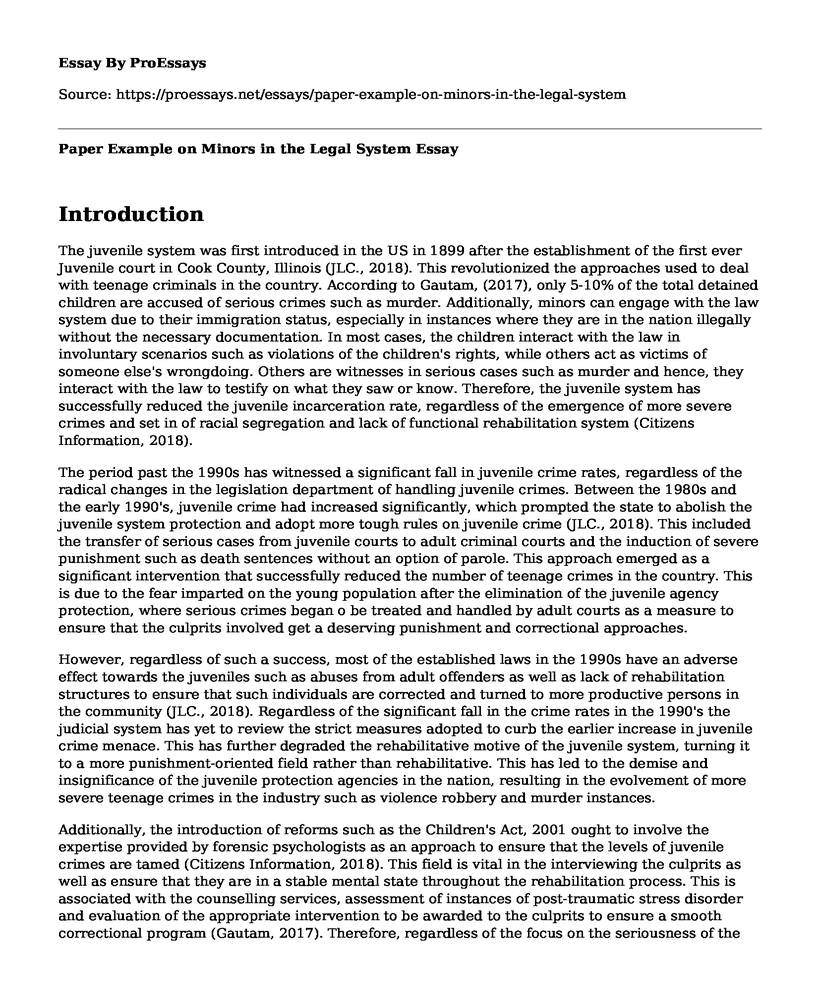Introduction
The juvenile system was first introduced in the US in 1899 after the establishment of the first ever Juvenile court in Cook County, Illinois (JLC., 2018). This revolutionized the approaches used to deal with teenage criminals in the country. According to Gautam, (2017), only 5-10% of the total detained children are accused of serious crimes such as murder. Additionally, minors can engage with the law system due to their immigration status, especially in instances where they are in the nation illegally without the necessary documentation. In most cases, the children interact with the law in involuntary scenarios such as violations of the children's rights, while others act as victims of someone else's wrongdoing. Others are witnesses in serious cases such as murder and hence, they interact with the law to testify on what they saw or know. Therefore, the juvenile system has successfully reduced the juvenile incarceration rate, regardless of the emergence of more severe crimes and set in of racial segregation and lack of functional rehabilitation system (Citizens Information, 2018).
The period past the 1990s has witnessed a significant fall in juvenile crime rates, regardless of the radical changes in the legislation department of handling juvenile crimes. Between the 1980s and the early 1990's, juvenile crime had increased significantly, which prompted the state to abolish the juvenile system protection and adopt more tough rules on juvenile crime (JLC., 2018). This included the transfer of serious cases from juvenile courts to adult criminal courts and the induction of severe punishment such as death sentences without an option of parole. This approach emerged as a significant intervention that successfully reduced the number of teenage crimes in the country. This is due to the fear imparted on the young population after the elimination of the juvenile agency protection, where serious crimes began o be treated and handled by adult courts as a measure to ensure that the culprits involved get a deserving punishment and correctional approaches.
However, regardless of such a success, most of the established laws in the 1990s have an adverse effect towards the juveniles such as abuses from adult offenders as well as lack of rehabilitation structures to ensure that such individuals are corrected and turned to more productive persons in the community (JLC., 2018). Regardless of the significant fall in the crime rates in the 1990's the judicial system has yet to review the strict measures adopted to curb the earlier increase in juvenile crime menace. This has further degraded the rehabilitative motive of the juvenile system, turning it to a more punishment-oriented field rather than rehabilitative. This has led to the demise and insignificance of the juvenile protection agencies in the nation, resulting in the evolvement of more severe teenage crimes in the industry such as violence robbery and murder instances.
Additionally, the introduction of reforms such as the Children's Act, 2001 ought to involve the expertise provided by forensic psychologists as an approach to ensure that the levels of juvenile crimes are tamed (Citizens Information, 2018). This field is vital in the interviewing the culprits as well as ensure that they are in a stable mental state throughout the rehabilitation process. This is associated with the counselling services, assessment of instances of post-traumatic stress disorder and evaluation of the appropriate intervention to be awarded to the culprits to ensure a smooth correctional program (Gautam, 2017). Therefore, regardless of the focus on the seriousness of the crimes committed by such individuals, forensic psychologists bring in the aspect of mental state evaluation, which focuses more on the overall wellbeing and the conviction of the right individuals through the use of a professional interview and screening procedures.
References
Citizens Information. (2018). Children and the criminal justice system. Retrieved from http://www.citizensinformation.ie/en/justice/children_and_young_offenders/children_and_the_criminal_justice_system_in_ireland.html.
Gautam, B. (2017). Forensic Psychology in the 'Juvenile Justice System': Determining Competency of Adolescents to stand trial as Adults. Retrieved from https://jguforensics.wordpress.com/2017/02/13/forensic-psychology-in-the-juvenile-justice-system-determining-competency-of-adolescents-to-stand-trial-as-adults/.
JLC. (2018). Youth in the Justice System: An Overview | Juvenile Law Center. Retrieved from https://jlc.org/youth-justice-system-overview.
Cite this page
Paper Example on Minors in the Legal System. (2022, Jul 04). Retrieved from https://proessays.net/essays/paper-example-on-minors-in-the-legal-system
If you are the original author of this essay and no longer wish to have it published on the ProEssays website, please click below to request its removal:
- Distributive Justice
- Why We Need the Police in the Society
- The Future of Criminology Essay
- Essay Sample on Marijuana Use: Debating Mental Health Benefits vs. Risks
- ACLU Advocates for New Immigration Policy in NY: Protecting Immigrant Rights
- Paper Example on Joanne's Right to Safety and Stable Childhood
- Essay Example on Border Patrol: Challenges of Protecting Borders in Crisis







